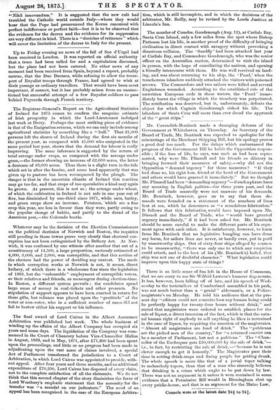Mr. Cavendish-Bentinck made a damaging defence of the Government at
Whitehaven on Thursday. As Secretary of the Board of Trade, Mr. Bentinck was expected to apologise for the miscarriage of the Merchant Shipping Bill, but his apology proves a good deal too much. For the delays which embarrassed the progress of the Government Bill he holds the Opposition respon- sible ; if the loss of life, he says, was such as had been repre- sented, why were Mr. Plimsoll and his friends so dilatory in bringing forward their measures of safety,—why did not the Opposition " demand urgency" for those measures? "If they had done so, his right hon. friend at the head of the Government and others would have granted it immediately." But we thought Mr. Plimsoll had been " demanding urgency"—if such a phrase have any meaning in English politics—for three years past, and the Board of Trade assuredly were not unaware of his demands. Mr. Bentinck, however, goes on to say that these de- mands were founded on a statement of the numbers of lives lost at sea, which he denounces as "a scandalous fabrication." It follows that this fabrication would have imposed upon Mr. Disraeli and the Board of Trade, who "would have granted urgency immediately," if it had been asked for. Mr. Bentinck should be more careful to make the different parts of his argu- ment agree with each other. It is satisfactory, however, to learn from Mr. Bentinck that no legislative bungling can have done any harm, for sailors lives are never, or hardly ever, put in peril by unseaworthy ships. Out of sixty-four ships alleged by seamen to be unseaworthy, "there was only one to which any suspicion could attach, and to the best of his (Mr. Bentinck's) belief, that ship was not one of doubtful character." What legislation could improve upon this happy state of things ?






























 Previous page
Previous page